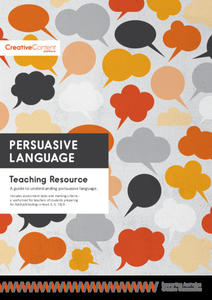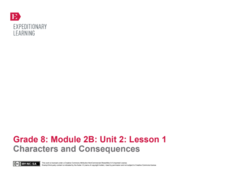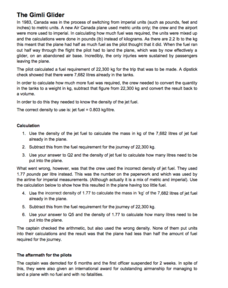Yummy Math
Should NFL Quarterbacks Shave or Grow a Beard?
What does facial hair have to do with quarterback ratings? Using a set of data that provides QBR with and without facial hair, football enthusiasts determine if performance is affected. It also has learners question if the relationship...
PBL Pathways
What Should Have Happened on Gilligan's Island?
"Just sit right back and you'll hear a tale ..." Gilligan's Island is a classic that spans generations and offers a problem-solving opportunity for scholars. Take a project-based learning approach to examine the population of the island....
Columbus City Schools
Planet X
How did the earth become the mass that it is now? Your young scientists explore this question through the concept of density. Their inquiries consider the impact of gravity on the formation of planets. The culminating activity of the...
Creative Content Australia
Persuasive Language
Language has power. Use the materials in a language arts teaching guide to equip learners with the knowledge of the persuasive techniques, both verbal and visual, that can be used to influence thinking.
US National Archives
Eastern Europe 1939-45 — Camps
Britain's decision not to bomb German death camps in World War II has provided many questions for historians, but with a primary source analysis lesson, high school students may be a step closer to finding out the truth. Learners read...
EngageNY
Characters and Consequences
Scholars consider how dialogue reveals aspects of a play's characters as they read Shakespeare's A Midsummer Night's Dream and complete a written conversation note-catcher. Additionally, pupils participate in an I Have/Who Has jigsaw...
Hazardous Waste Management Program
Molar Mass Determination from Freezing Point Depression
Let the data tell the story. A lab activity has pupils collect temperature data on solutes as they melt and freeze. They use their data to create a cooling curve and then calculate the molar mass using the freezing point depression.
American Museum of Natural History
What do You Know About Life on Earth?
Humans have only inhabited the earth for a fraction of the time that life has existed. Young scientists explore the facts about the emergence of life on Earth with an interactive resource. While highlighting different types of life, the...
University of California
Interactions in Baghdad and the Abbasid Caliphate
An interesting resource focuses on the cultures of different peoples that have lived in Baghdad and their interactions. Academics view 11 sources to understand how Baghdad has been home to people of many faiths and cultures throughout...
Amani Project
Teach the Mood Meter
The third activity from the Amani Project has youths create a Mood Meter. The colorful meter, divided into red, yellow, blue, and green squares, lets participants indicate not only how they are feeling but also permits them to indicate...
Benjamin Franklin Tercentenary
Let’s Throw an Electric Science Party!
Are you looking for a shockingly good lesson? Check out one that has middle schoolers recreate four of Benjamin Franklin's experiments. Groups investigate, observe, and draw conclusions about static electricity and electrical current....
National Wildlife Federation
Butterfly Life Cycle
Caterpillars and butterflies each have their own unique challenges. While studying the life cycle of butterflies, learners focus on the threats to each stage. While some threats will be the same, each stage has its own unique...
Baylor College
Water: Post-Assessment
Very simply, the science class will discuss what they have learned during The Science of Water unit and take a multiple-choice post-assessment quiz. A few other closing activities are suggested for you to choose from, such as having...
Southwestern Medical Center
Field Epidemiology: Investigation of an Unknown Disease
More than 90 percent of the people in a building have come down with an illness, and it is your job to investigate. Teachers give scientists the data needed to decide what is important and how they can solve the mystery....
WindWise Education
How Can I Design Better Blades?
Small groups use information they have learned about blade construction to design, build, and test their own concepts. The teams compete in order to determine which design has the best average power output.
ThoughtCo
Interview Somebody New!
The best way to get to know someone is by interviewing them. Use a interviewing activity that has individuals asking a new person questions like where they were born, what they did over the summer, goals for the year, and how many...
CK-12 Foundation
Additive and Multiplicative Rules for Probability: Red Dress? Blue Dress? Both!
The sum of the parts is greater than the whole. An interactive uses a Venn-like model to show the percentage of females from a survey that have a blue dress, a red dress, or both. The pupils determine the numbers in each category...
CK-12 Foundation
Inductive Reasoning from Patterns: Greeting with Handshakes
Greet this resource like an old friend. An interactive has users investigate the number of handshakes required for a group to greet each member. A set of challenge questions ensures that learners have a solid understanding of the...
CK-12 Foundation
Single Bar Graphs: Cupcakes
What is a little cake among friends? Given the relationship between the number of cupcakes five friends have, pupils create a bar graph. The learners answer questions about the graph and adjust the graph if one friend shares some of his...
CK-12 Foundation
Limit of a Sequence: Finding the Limit of a Sequence (Part 4)
Take a look at another alternating sequence. The resource provides a graphical display of a sequence that alternates between two values. Pupils use the display to determine whether the sequence has a limit. Given a theory of limit,...
Royal Society of Chemistry
Gimli Glider—Anecdotes for Chemistry Teachers
What's the moral of this story? Units save lives! Teach measurement conversion through storytelling in a quick math-based lesson. Young scientists learn how one country's decision to swap from imperial to metric standard units caused an...
Little Kids Rock
The Influence of Latin Music in Postwar New York City
Music has often been called the international language that transcends cultures and regions. Scholars analyze the impact of Latin American music on New York City culture in the years following World War II. They research music, video,...
Creative Visions Foundation
Introduction to the Convention on the Rights of the Child
The UN Conventions on the Rights of the Child (CRC) has been ratified by 196 countries so far ... and still counting! Using the first of two lessons covering the Introduction to the Convention on the Rights of the Child, scholars learn...
College Board
2008 AP® Environmental Science Free-Response Questions
Some of the oiliest creatures on earth may be the answer to our energy crisis! Using a four-question assessment, resource scholars consider the use of microalgae as fuel among other environmental science topics. Each question has several...
Other popular searches
- 1st Grade Grammar Has/have
- Helping Verbs Have Has
- I Have Who Has
- Have and Has
- I Have Who Has Game
- Using Has and Have
- Have To/has To
- Verbs Has and Have
- Have Got Has Got
- Have Has Had
- Language Has and Have
- Have Got /Has Got























